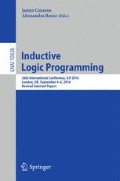Abstract
Lifted relational neural networks (LRNNs) are a flexible neural-symbolic framework based on the idea of lifted modelling. In this paper we show how LRNNs can be easily used to specify declaratively and solve learning problems in which latent categories of entities, properties and relations need to be jointly induced.
Access this chapter
Tax calculation will be finalised at checkout
Purchases are for personal use only
Notes
- 1.
Established notions such as “rule” are further used also for their weighted analogies.
- 2.
These represent aggregation operators that can take a variable number of arguments.
- 3.
In general LRNNs support non-ground query atoms but in this paper we will not need them. Therefore we assume only ground query atoms for simplicity.
- 4.
The membership degrees are simply obtained as applying sigmoids on the respective weights in this particular case, so the two representations essentially bear the same information.
- 5.
Downloaded from https://alchemy.cs.washington.edu/data/animals/.
- 6.
Downloaded from https://alchemy.cs.washington.edu/data/nations/ and from https://alchemy.cs.washington.edu/data/umls/.
References
Bader, S., Hitzler, P.: Dimensions of neural-symbolic integration-a structured survey. arXiv preprint cs/0511042 (2005)
Beltagy, I., Chau, C., Boleda, G., Garrette, D., Erk, K., Mooney, R.: Montague meets markov: deep semantics with probabilistic logical form. In: Proceedings of the *SEM, pp. 11–21 (2013)
Blockeel, H., Uwents, W.: Using neural networks for relational learning. In: ICML-2004 Workshop on Statistical Relational Learning and its Connection to Other Fields, pp. 23–28 (2004)
Cohen, W.W.: Tensorlog: a differentiable deductive database. arXiv preprint arXiv:1605.06523 (2016)
Ganter, B., Stumme, G., Wille, R. (eds.): Formal Concept Analysis: Foundations and Applications. LNCS (LNAI), vol. 3626. Springer, Heidelberg (2005)
Hájek, P.: Metamathematics of Fuzzy Logic, vol. 4. Springer, Dordrecht (1998)
Kok, S., Domingos, P.: Statistical predicate invention. In: Proceedings of the 24th International Conference on Machine Learning, pp. 433–440 (2007)
McCray, A.T.: An upper-level ontology for the biomedical domain. Comp. Funct. Genomics 4(1), 80–84 (2003)
Miclet, L., Bayoudh, S., Delhay, A.: Analogical dissimilarity: definition, algorithms and two experiments in machine learning. J. Artif. Intell. Res. 32, 793–824 (2008)
Mitchell, T.M., Cohen, W.W., Hruschka Jr., E.R., Talukdar, P.P., Betteridge, J., Carlson, A., Mishra, B.D., Gardner, M., Kisiel, B., Krishnamurthy, J., Lao, N., Mazaitis, K., Mohamed, T., Nakashole, N., Platanios, E.A., Ritter, A., Samadi, M., Settles, B., Wang, R.C., Wijaya, D.T., Gupta, A., Chen, X., Saparov, A., Greaves, M., Welling, J.: Never-ending learning. In: Proceedings of the Twenty-Ninth AAAI Conference on Artificial Intelligence, January 25–30, 2015, Austin, Texas, USA, pp. 2302–2310 (2015)
Daniel, N.O., Stern, J., Wilkie, O., Stob, M., Smith, E.E.: Default probability. Cogn. Sci. 15(2), 251–269 (1991)
Prade, H., Richard, G.: Reasoning with logical proportions. In: Twelfth International Conference on the Principles of Knowledge Representation and Reasoning (2010)
Richardson, M., Domingos, P.: Markov logic networks. Mach. Learn. 62(1–2), 107–136 (2006)
Rocktäschel, T., Riedel, S.: Learning knowledge base inference with neural theorem provers. In: NAACL Workshop on Automated Knowledge Base Construction (AKBC) (2016)
Rummel, R.J.: The dimensionality of nations project: attributes of nations and behavior of nations dyads, pp. 1950–1965. Number 5409. Inter-University Consortium for Political Research (1976)
Šourek, G., Aschenbrenner, V., Železný, F., Kuželka, O.: Lifted relational neural networks. In: Proceedings of the NIPS Workshop on Cognitive Computation: Integrating Neural and Symbolic Approaches (2015)
Acknowledgments
GS and FZ acknowledge support by project no. 17-26999S granted by the Czech Science Foundation. OK is supported by a grant from the Leverhulme Trust (RPG-2014-164). SS is supported by ERC Starting Grant 637277. Computational resources were provided by the CESNET LM2015042 and the CERIT Scientific Cloud LM2015085, provided under the programme “Projects of Large Research, Development, and Innovations Infrastructures”.
Author information
Authors and Affiliations
Corresponding author
Editor information
Editors and Affiliations
Rights and permissions
Copyright information
© 2017 Springer International Publishing AG
About this paper
Cite this paper
Šourek, G., Manandhar, S., Železný, F., Schockaert, S., Kuželka, O. (2017). Learning Predictive Categories Using Lifted Relational Neural Networks. In: Cussens, J., Russo, A. (eds) Inductive Logic Programming. ILP 2016. Lecture Notes in Computer Science(), vol 10326. Springer, Cham. https://doi.org/10.1007/978-3-319-63342-8_9
Download citation
DOI: https://doi.org/10.1007/978-3-319-63342-8_9
Published:
Publisher Name: Springer, Cham
Print ISBN: 978-3-319-63341-1
Online ISBN: 978-3-319-63342-8
eBook Packages: Computer ScienceComputer Science (R0)

